Promises, Promises: Which Liberal campaign promises do Canadians want the government to follow through on?
January 20, 2016
In our latest poll we asked how people felt about a range of the promises that the Liberal Party made while campaigning last fall. In each case, we asked if people wanted them to go ahead with the promise, would prefer they not go ahead, or didn’t care much one way or another.
The results, in a nutshell, reveal:
• Large majorities want the government to proceed with tax cuts for the middle class (80%), with increasing taxes on the wealthiest people (77%) and with increased spending on infrastructure (64%). In each of these cases, opposition never rises above 18%.
• Opinion is more mixed when it comes to being willing to run a deficit to help stimulate the economy: 48% say go ahead, 38% would prefer not, and 14% have no strong feelings.
• Similar results are found for “changing our role in the fight against ISIS, to put more emphasis on training local troops and ending our bombing missions”.
• When it comes to changing the electoral system and how we vote, 41% say go ahead, 25% say don’t and 34% have no strong feelings.
• Finally, on legalization of marijuana, opinion is split with 38% saying go ahead, 38% preferring not, and 24% expressing limited interest.
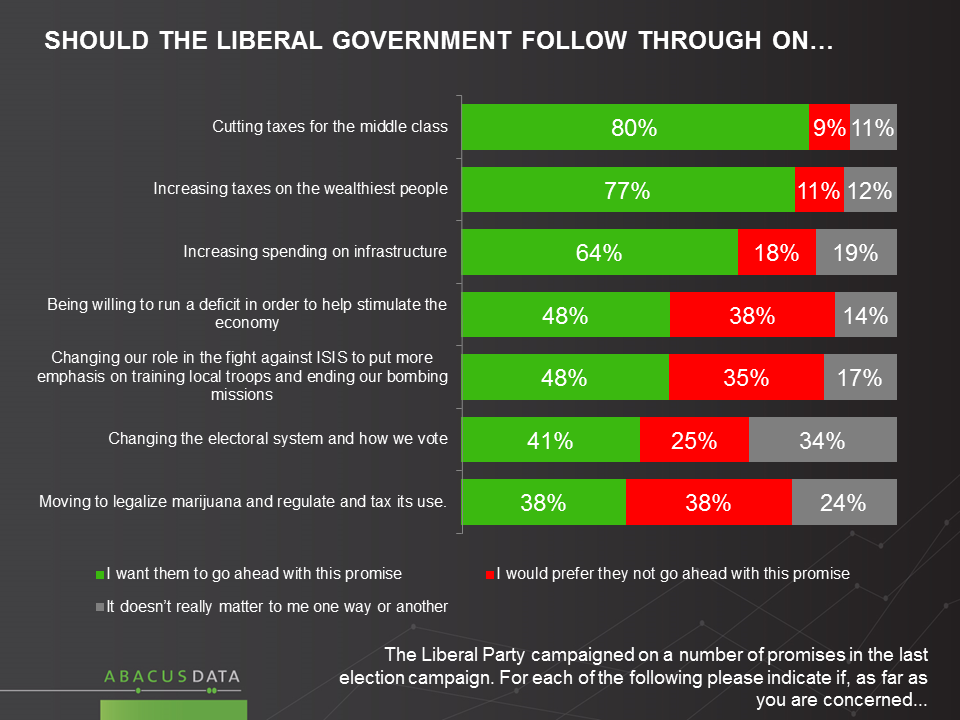
Naturally, the results to these questions vary somewhat by partisan inclination and other socio-demographic differences.
Here’s what that analysis shows:
When it comes to running a deficit to stimulate, support for going ahead is higher than average in Quebec and Atlantic Canada and among voters on the left. Among those who voted CPC, only 17% want the government to go ahead with this promise, but notably, among Albertans support for a stimulative deficit is 43%.
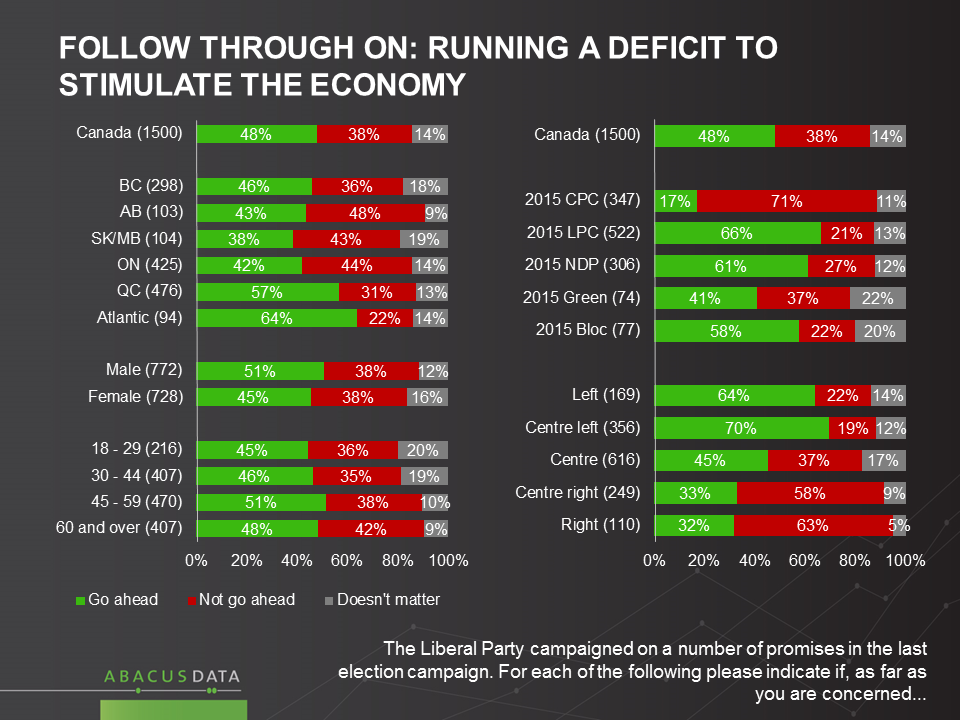
Support for spending more on infrastructure is high and pretty consistent across subgroups. It is lowest among CPC voters, but 52% of those voters support going ahead with this promise. Only those who consider themselves “right wing” tend to be opposed. Those on the right account for less than 10% of all voters. Among centre-right voters, 63% want the government to go ahead with this promise.
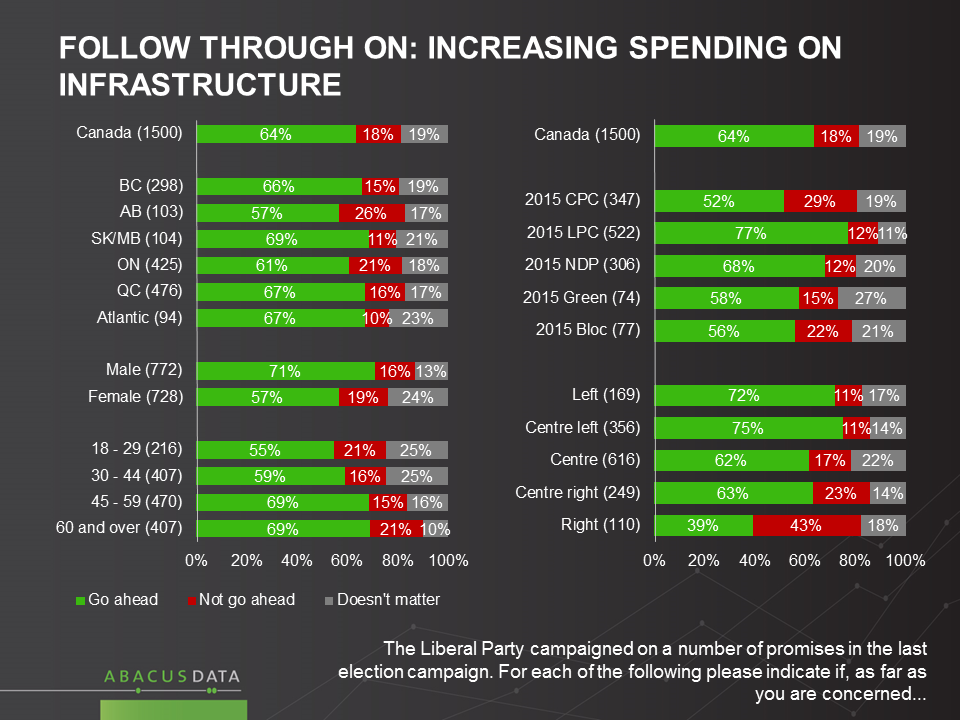
When it comes to adjusting our role in the fight against ISIS, young people are more supportive of this promise and older people more hesitant. Majorities of those on the left want to see this promise kept, as well as a plurality of those in the centre.
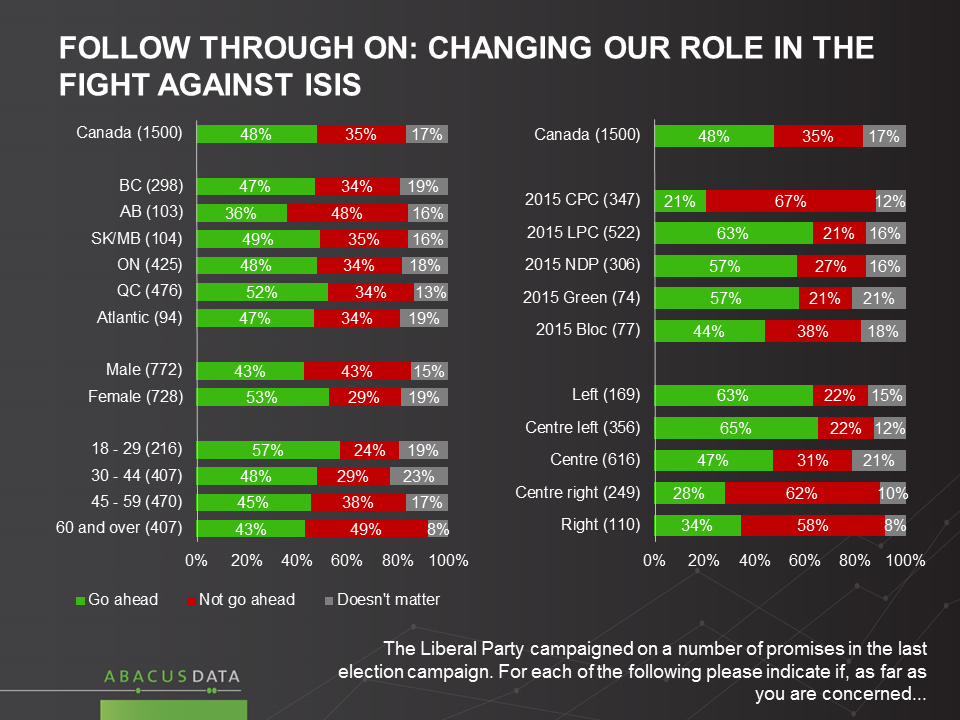
On changes to the electoral system, support for change is highest in BC and Quebec, while only in Alberta is a plurality opposed to this idea. While Conservative supporters are more likely to be opposed than supportive, the differences are not as large as might be expected. Among those who voted CPC in October 28% want the government to proceed, 47% prefer not, and 25% have no strong views.
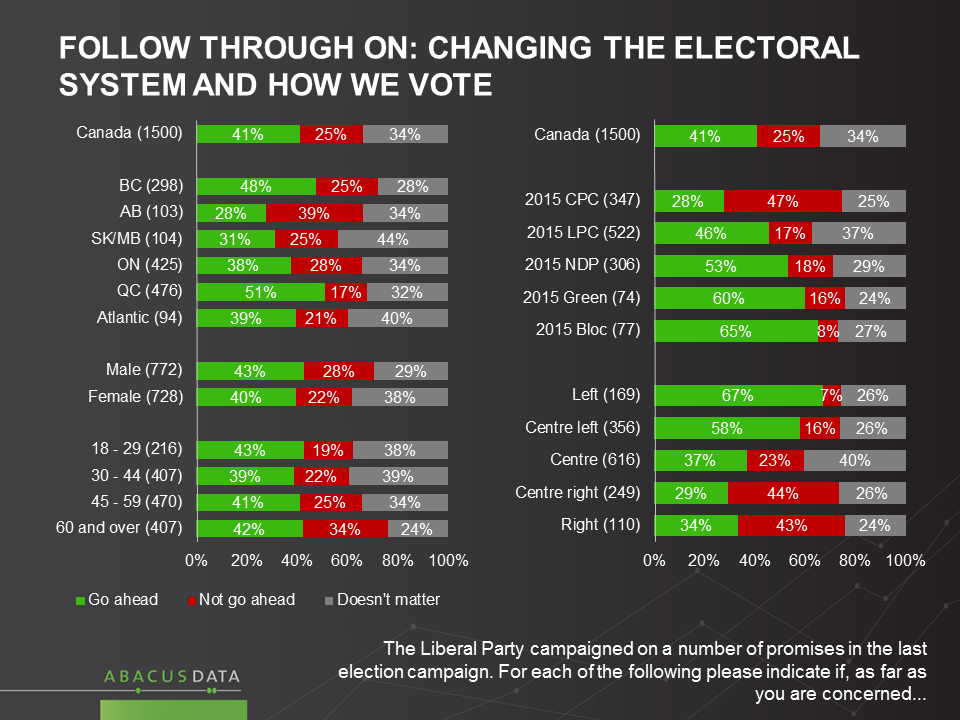
There are virtually no differences when it comes to cutting taxes for the middle class: 67% of Conservatives, 83% of New Democrats, and 88% of Liberals want to see this proceed. On higher taxes for the wealthiest large majorities in every region, and a majority of CPC supporters (56%) as well as 86% of Liberals (86%) and New Democrats want this promise to be carried through. It is worth noting that among those with household incomes above $100,000, 70% believe the Liberals should go ahead with their promise to increase taxes on the wealthiest while 19% prefer that they would not go ahead.
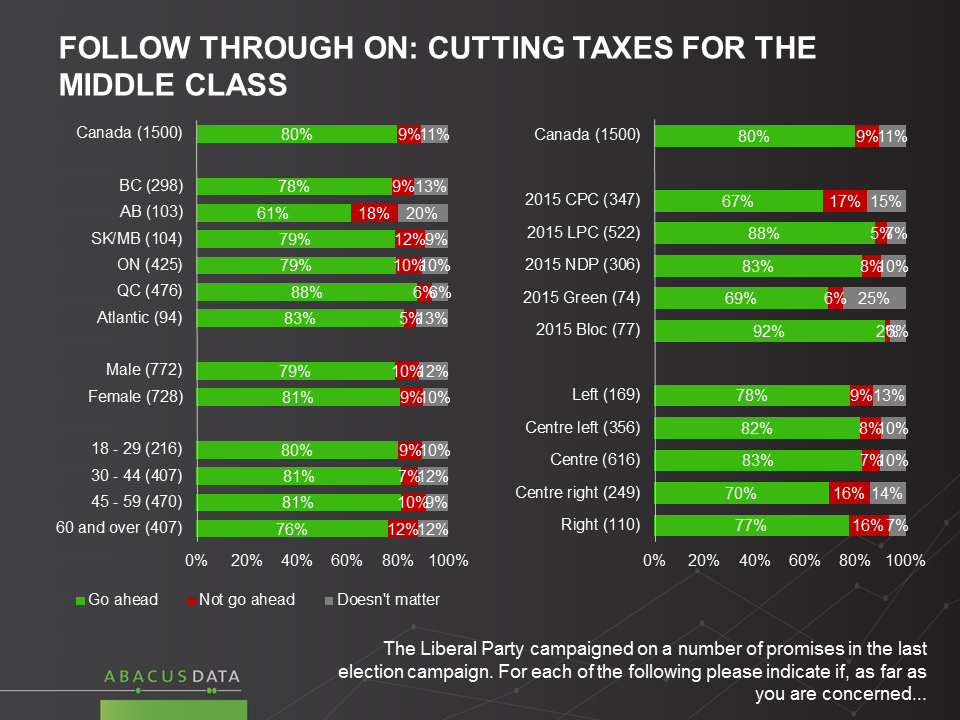

On the promise to “legalize marijuana and regulate and tax it’s use”, men, younger people, and those on the left tend to be more supportive, while women, older people and those on the right feel otherwise. 61% of CPC voters want this idea dropped, which reflects the fact that those on the “centre right” are 27% pro, 50% con, while those on the “right” are 16% pro – 67% con. Worth noting is that among voters on the centre, opinion is clearly mixed, with 35% wanting the promise kept, 40% saying no. Opposition to legalizing marijuana is higher among those who say they have never tried it. 53% think the Liberals should not go ahead with their promise while 23% think they should go ahead. Support for going ahead with the promise is higher among those who have used marijuana (40% among those who have tried only once or twice, 80% among the 14% who use it at least sometimes).
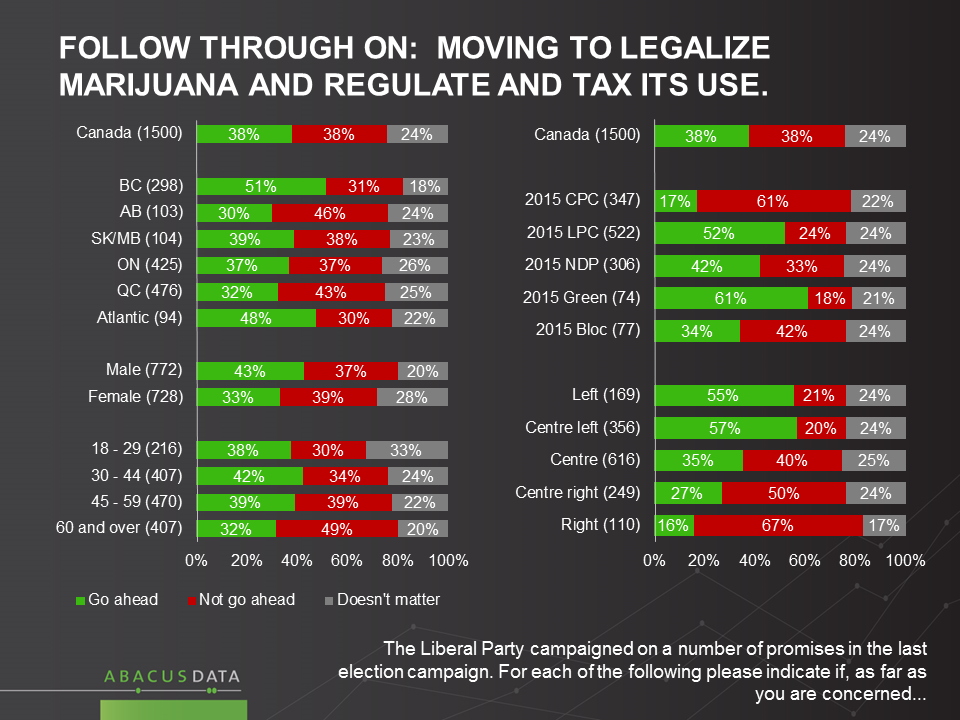

The Upshot
According to Bruce Anderson: “The Liberals no doubt will feel increasing pressure to review their list of promises as economic and other circumstances evolve. As things stand right now, these numbers suggest that there remains broad comfort with the approach they promised on taxation, and infrastructure spending, and a reasonable level of acquiescence when it comes to running a deficit. Results show more tension across political lines when it comes to electoral reform, marijuana legalization and a shift in our role in the fight against ISIS.
The data don’t suggest that following through on these promises will necessarily trigger a massive backlash, but rather that there will be a need for careful execution and effective communications to mitigate concerns or anxieties.”
Methodology
Our survey was conducted online with 1,500 Canadians aged 18 and over from January 8 to 12, 2016. A random sample of panelists was invited to complete the survey from a large representative panel of over 400,000 Canadians.
The Marketing Research and Intelligence Association policy limits statements about margins of sampling error for most online surveys. The margin of error for a comparable probability-based random sample of the same size is +/- 2.6%, 19 times out of 20. The data were weighted according to census data to ensure that the sample matched Canada’s population according to age, gender, educational attainment, and region. Totals may not add up to 100 due to rounding.
Abacus Data Inc.
We offer global research capacity with a strong focus on customer service, attention to detail and value added insight. Our team combines the experience of our Chairman Bruce Anderson, one of Canada’s leading research executives for two decades, with the energy, creativity and research expertise of CEO David Coletto, PhD.




